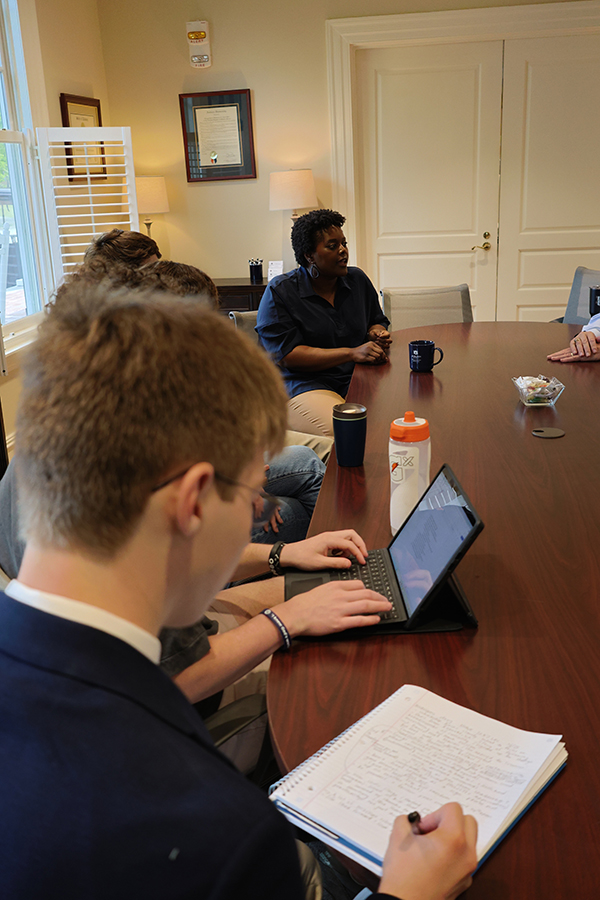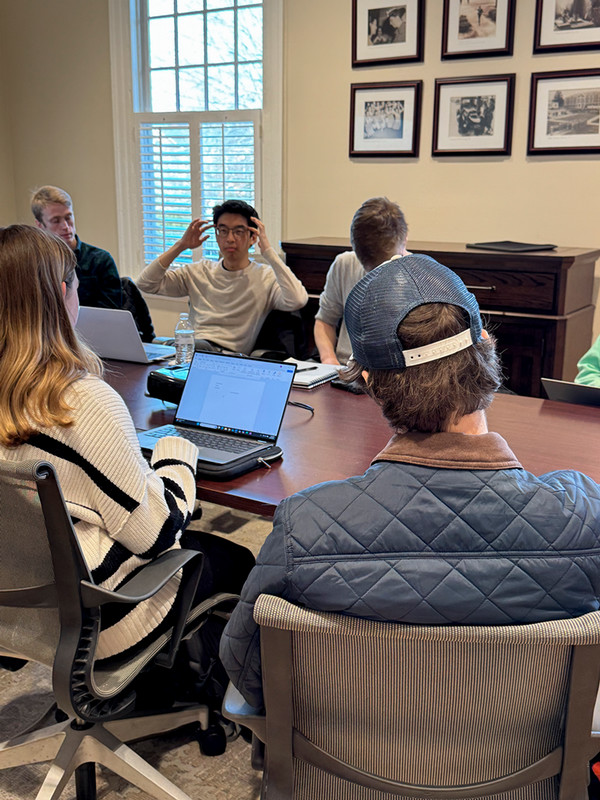content body
“My life has been changed by this scholarship, and my world view has altered,” said the Rev. Marian Royston, a 2012 Auburn alumna who spent a year as one of 12 Mitchell Scholars in Ireland.
But if being awarded the prestigious scholarship was “life-changing,” so too was the experience of applying for this and other scholarships.
“The process helped me clarify the things that I wanted to focus on,” Royston said, explaining to the HONR1087 Lyceum, “Going for the Gold: Preparing for National Scholarships, Graduate School and Other Opportunities” class participants.
The Honors College recently hosted Royston and five fellow alumni to speak to the current class. Royston drove in from Birmingham, where she recently was appointed Senior Pastor of St. Paul United Methodist Church.

Marian Royston speaks to the class about her time as a Mitchell Scholar
Royston was not alone in delivering this message to the class.
“It’s best to go into these applications just assuming you’ll be rejected, and find value in the process itself,” said Dr. Jordan Anderson, a 2010 graduate.
After spending two years at Oxford University as a Rhodes Scholar, Anderson earned a medical degree from Harvard Medical School and an MBA from Harvard Business School.
Now the chief population health officer at Belong Health and an assistant professor of clinical medicine at Vanderbilt University, he cited the encouragement and mentorship he received from several figures while he was at Auburn, including his swimming coaches, Paul Harris, the former associate director of Honors and other faculty, who motivated him to apply for the Rhodes Scholarship.
“This course is, as its title suggests, about preparing students to apply for national scholarships, but I see it as doing more than that,” said Laura Stevens, director of the Honors College. “The central goal is to help high-achieving students imagine all sorts of futures for themselves and learn what steps will help them find those futures. That is the true gold I want them to go for in this class.”
Conversations with alumni who have received some of these scholarships have been crucial to advancing this goal.
“It seems so much more attainable when you can talk to alumni who have won these awards,” commented Victoria Ashley, a senior Honors student with a double major in political science and history. “Everyone has been so generous in talking about their experiences.”
David Lether, a junior electrical engineering major and Honors student, agreed about the benefits of hearing from alumni: “It just demystifies the whole process.”
A lyceum is one of four types of “participation” courses that the Honors College offers.
Such courses, which usually count for one credit and have satisfactory-unsatisfactory grading, present opportunities for students to explore ideas without worry about the impact of intellectual risk-taking on their GPA. Up to three participation courses may count towards the 24 Honors course credits that students must complete to graduate with distinction in Honors.
Lyceum courses, named after the gymnasium where the ancient philosopher Aristotle taught, provide a curricular setting for highly interactive forms of learning, especially involving debate and the conversational exchange of ideas.
“For me, a lyceum, whatever its topic, provides a kind of mental calisthenics and fosters intellectual community. The lyceum course struck me as a useful structure for educating groups of students about national scholarships as well as other opportunities,” Stevens said. “I’ve been really pleased with how it’s gone, so we are planning to offer it at least once a year going forward.”

Allen Li speaks to the class about his time as a Truman Scholar
Unlike other Honors courses, the “Going for the Gold” lyceum is open to all undergraduates who receive a nomination from a professor, dean or associate dean in their college.
“Ideally, going forward, students will take this course in the second semester of freshman year or early in their sophomore year,” Stevens said. “That way they can learn about these opportunities early and can develop long-term plans. But the course is open to students at all stages of undergraduate study.”
Every student concludes the course by writing a personal statement that they later can draw upon for applications to graduate school, law or medical school and major national scholarships.
One virtue of the lyceum approach for Stevens is that as the same group of students explore these opportunities together, they form a community of mutual support.
“One thing I love about Auburn is how humble its students are," she said. "Even as I want to encourage them to be more ambitious in the opportunities they seek out, I don’t want them to lose the community-centered ethos so many of them have.”
This selfless mentality has also shone through in the graduates who have visited the class.
“These alumni are very busy people with enormous responsibilities. When I started contacting them about talking to the class, I figured several would say they did not have time, but without exception, they expressed their eagerness to help current students, paying forward the support they received while they were here.”
Alumni visited the class from near and far, in person and online.
Ayden Kemp, an Astronaut Scholar and Goldwater Scholar who graduated last May, had the shortest distance to travel, walking across campus from the Samuel Ginn College of Engineering where he is pursuing a master’s degree in biosystems engineering.
Fellow 2024 Engineering graduate, Maggie Nelson, spoke over Zoom from her office at Cambridge University, where she is currently a Churchill Scholar, pursuing her MPhil in materials science.
Hannah Tarwater, a two-time education alumna, visited the lyceum just before leaving campus to begin a Fulbright English Teaching Assistant Grant in Peru.
Allen Li, a 2023 alumnus and Truman Scholar, came in from Washington, D.C., where until recently he worked as a special assistant in the U.S. Department of Treasury’s Office of the Deputy Secretary.
The conversations with alumni yielded multiple lessons for the lyceum’s students.
“This has been a great space for me to reflect on my experiences and goals,” said India Warren, a junior Honors student majoring in civil engineering.
Gavin Grann, a sophomore engineering major and Honors student, cited one lesson he had learned about the illusion of perfection: “You think people who have won these scholarships are perfect, and that can be a really harmful misconception. Talking to alumni has taught us that these are real people who have had their own struggles.”
Grann also reflected on what the course had taught him about the value of making the effort to apply for national scholarships: “It’s an opportunity, but what’s important is what you make of it and how this opportunity helps you have the life you want.”
Every semester the Honors newsletter features one or two courses that epitomize the Auburn Honors educational experience. No single requirement or feature defines all Honors classes. Instead, these courses, which involve almost all fields of study, share the goal of providing intellectual enrichment for the Honors College’s students, enhancing the already rigorous offerings of an Auburn curriculum. Taught through a variety of approaches, they often take advantage of smaller class sizes to utilize more active and collaborative forms of learning.



